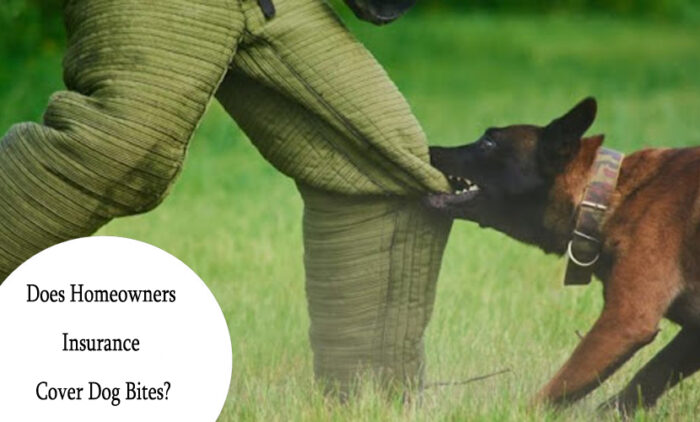Does homeowners insurance cover dog bites? Having personal liability and medical payments coverage in your homeowners insurance can provide financial protection in case a dog under your care bites someone.

It may help cover expenses like medical bills and legal costs resulting from such incidents. However, it’s important to note that not all insurance providers include coverage for dog bites in their policies.
Also, the availability of this coverage can vary based on factors like the insurance company you’re with, the specifics of your policy, where you live, and even the breed of your dog.
Understanding these factors can help you determine if you have the necessary protection in place for such situations.
How Does Homeowners Insurance Cover Dog Bites?
When it comes to how homeowners insurance addresses dog bites, the coverage is designed to provide financial protection in case your dog injures someone and you are deemed responsible.
Within your homeowners’ insurance policy, there are two key coverages that come into play in such situations.
Firstly, personal liability coverage can help cover the costs associated with injuries caused by your dog and any potential legal expenses that may arise, all within the limits set by your policy.
Secondly, medical payment coverage can assist in paying for necessary medical expenses resulting from injuries that occur on your property.
For instance, if a friend is knocked down by your dog and sustains an injury like a broken ankle, your medical payments coverage can step in to cover their hospital bills, up to the specified limit outlined in your policy.
However, it’s important to understand these aspects of your homeowners insurance to ensure you have the appropriate protection in place for scenarios involving dog bites.
Does Homeowners Insurance Cover Dog Bite Off My Property?
When exploring whether homeowners insurance covers dog bites that occur off your property, it’s crucial to note that the extent of coverage can vary depending on the specifics of your policy.
Some policies may indeed provide protection for dog bites that occur away from your property, while others might impose limitations.
To gain a clear understanding of your coverage, it’s always advisable to consult with your insurance provider directly.
They can provide you with detailed information regarding the specifics of your policy and whether or not it includes coverage for dog bites that happen off your property.
By doing so, you can ensure that you have the necessary protection in place for a variety of scenarios, regardless of where they occur.
How To File A Homeowner’s Insurance Dog Bite Claim
If your dog has bitten someone, it’s essential to act promptly and follow proper procedures to file a homeowner’s insurance claim.
This guide will help you understand the key steps required to navigate the claims process effectively.
Seek Medical Attention
Prioritize your wellbeing and health by promptly seeking medical care. This step is crucial not only for your well-being but also for providing the necessary documentation of your injuries for your claim.
Identify The Dog Owner
Make sure to record the dog owner’s name and contact information as soon as possible following the incident. This information is essential for moving forward with your dog bite case.
Record All Details
Write down a detailed account of the incident, including what you were doing before the attack, how it played out, the level of pain experienced, and any witness information.
Take Pictures
Document your physical injuries, torn or bloody clothing, and any other relevant details through photographs.
File A Report
Legally document your dog bite by filing a report with the local police department or your local animal control department.
Contact An Attorney
Consult with a lawyer before speaking with the insurance company. An attorney can provide extensive knowledge of dog bite laws and settlement procedures, and can speak on your behalf.
Understand The Factors Influencing Settlement Amounts
Several factors can influence the settlement amount, including the severity of injuries, whether the injuries prevent the victim from functioning normally, medical bill expenses, economic losses, the amount of insurance coverage available, and whether the victim provoked the dog.
Prove Negligence
To win your case, you must prove negligence. Collect evidence, locate witnesses, review medical information, and examine everything that happened before, during, and after the attack.
Calculate Damages
Determine the total value of the dog bite claim by factoring in medical bills, future treatment costs, lost wages, permanent injuries, and costly psychological damage.
Negotiate A Settlement
After receiving a demand package, the insurance adjuster will typically offer a settlement within 30 days. Your attorney will determine if the offer is fair and negotiate as needed.
Resolution And Release
Once there is a resolution, the plaintiff will sign a release in exchange for payment.
By following these steps and providing all necessary details, you can ensure a smoother claims process for your homeowners insurance dog bite incident.
Remember to seek legal advice if needed and stay proactive in gathering evidence and negotiating a fair settlement.
How To Prevent Dog Bites
Avoiding situations where your dogs may bite someone is important for the wellbeing of both parties involved. Here are some practical tips to help minimize the risk of a dog bite:
- Keep your dog on a leash to prevent potential biting incidents and to avoid confrontations with other animals that could lead to injuries.
- When introducing new people or dogs, allow your dog to approach them gradually in a controlled environment. If your dog shows signs of aggression or discomfort, consider using a muzzle during initial interactions.
- Inform visitors about your dog’s behavior and preferences to ensure safe interactions. Share any specific triggers or sensitivities your dog may have to prevent misunderstandings.
- Train your dog to maintain a safe distance from others, either by staying in a designated area or by rewarding them for appropriate behavior around guests.
- Encourage your dog to chew on appropriate items, like toys, to deter them from mouthing or biting guests or their belongings.
- For dogs with aggression issues or fear, seeking help from a professional dog trainer can provide tailored training methods and safety advice to prevent potential biting incidents and promote positive interactions with others.
By implementing these strategies and seeking professional guidance when needed, you can promote responsible pet ownership.
Frequently Asked Questions
Do I Have To Add Dogs To My Homeowners Insurance?
While not mandatory, it is advisable to add your dog to your homeowners insurance policy to ensure coverage for any medical expenses or damages caused by your dog.
If your dog isn’t listed on your policy, your insurer may not cover any claims related to your dog.
What Factors Affect Coverage For Dog Bites In Homeowners Insurance?
Coverage for dog bites in homeowners insurance can vary depending on the state you live in, your insurance company, your dog’s breed, and its bite history.
Some companies may consider the owner liable if their dog has a bite history, while others may not cover certain breeds known for aggressive behavior.
What Happens If My Homeowners Insurance Doesn’t Cover Dog Bites?
If your homeowner’s insurance doesn’t cover dog bites, you may need to consider purchasing a separate liability policy for your dog.
This policy, also known as canine liability insurance, covers medical expenses and legal fees resulting from dog bites or attacks.
How Much Coverage Does Homeowners Insurance Provide For Dog Bites?
The amount of coverage for dog bites in homeowners insurance depends on the policy’s liability limit.
Typically, policies provide coverage up to $300,000 per incident, but higher limits are available.
It’s essential to review your policy and adjust the coverage as needed to ensure adequate protection for dog-related incidents.


